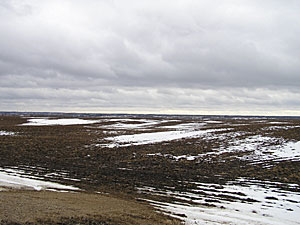|
Photos
Respond to this story
|
Tax break boosts farmland prices
December 28, 2004
 |
| Buying farmland is all about numbers these days and one of the most popular is 1031. It's a tax break that's bringing the effects of urban sprawl to all parts of the state. (MPR file photo) |
Worthington, Minn. — The last time farmer Richard Lunz saw a land market like the current one was more than 20 years ago. Lunz farms in Martin County on the Iowa border. The black soil there is some of the most productive in the nation. In 1981, Martin County farmland prices peaked at just over $4,000 an acre. Lunz says prices are closing in on that milestone.
"There's a lot of better land that's running in the $3500-$3,600 area," says Lunz. "And those are comparable to what we seen in the early 1980s."
Interest rates are a big reason for the farmland price jump. The low cost of money means local farmers can bid more on neighboring land, driving prices up. Cheap money also affects land prices in another way, it brings in outside bidders. This extra competition means more spirited bidding and higher prices. Richard Lunz says the outside interest often comes from the Twin Cities.
"Everytime you go up to the cities you see another housing project," says Lunz.
 | |||
Most of the new housing goes up on former farm land. Farmers who sell, reap a huge financial harvest, anywhere from $15,000 an acre to more than $50,000. Many would still like to farm and they're looking for a tax break on their profits. They can do both through what's known as a 1031 exchange. It means a farmer takes the money earned on one land sale and uses it to buy a new parcel somewhere else. Usually they look for top quality land, like that found in Martin County. Flush with cash and anxious to avoid a tax bill of 20 percent or more, farmer Richard Lunz says the 1031 players usually outbid the locals.
"When you get substantial blocks of this coming out and land is being repurchased at rates that don't reflect the productivity of the land, it makes it very hard to compete against that," says Lunz.
It's happening all across the state. As cities like Mankato and St. Cloud expand, farmland is converted into developments. Mankato real estate broker Chuck Wingert estimates a third of Minnesota farmland sales are 1031 exchanges.
"Definitely the sales that the investors coming out of 1031's are involved with, they are a factor in pushing that price above a level that would happen if they weren't there," Wingert says.
Wingert says 1031 bidders can boost the price of a particular piece of land by 20 percent or more. He says that's one reason why Minnesota land prices increased more than 12 percent in 2003, the fastest growth in the nation. Wingert though thinks the end of the boom may be in sight. He says the Federal Reserve is boosting interest rates.
"The discount rate was 1 percent, now it's 2 and a quarter," says Wingert. "And the feds have made it real clear we're going to continue this upward trend. And as it continues upwards it will slow the expansion boom, which will slow the developers buying. And that'll take a lot of the 1031 money out of the market."
But for now the 1031 action continues. Richard Lunz watched a farmer from the southern Twin Cities pay more than $2 million cash last summer for Martin County farmland. The metro resident plans to move to Martin County and farm the acres. Lunz is always looking for extra land himself, but says prices now are too high. He's not angry, just philosophical about the 1031 buyers.
"I'm sure that a lot us in the same position would probably do the same thing," says Lunz.
Lunz says the high land prices are especially hard on young farmers. He says most can't afford to buy. Lunz has farmed more than 30 years and he's seen many economic peaks and valleys. He says people paying high land prices now may regret the move if the market turns. He saw that happen in the 1980's. Land prices fell more than 50 percent in five years.
|
News Headlines
|
Related Subjects
|
